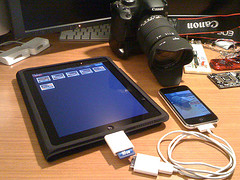 As the news of a TSA agent stealing iPads from checked luggage erupted last week, many travelers – business and leisure alike – are re-examining how to prevent theft of their electronics, including laptops, MP3 players, e-readers, and more. (See our FAQ does travel insurance cover theft for an overview.)
As the news of a TSA agent stealing iPads from checked luggage erupted last week, many travelers – business and leisure alike – are re-examining how to prevent theft of their electronics, including laptops, MP3 players, e-readers, and more. (See our FAQ does travel insurance cover theft for an overview.)
Why electronics get stolen
Way back when, it was cameras, then it was camcorders, then it was laptops, and now it’s the latest hot electronic device – the iPad. Why? There’s a relatively good return on the investment of the theft. Criminals understand that there’s a risk to stealing and so they go for the items they can sell at a good price.
What happens to the stolen goods
In the past, you could unload stolen goods at a pawn shop or on a street corner, but it’s even easier now. As easy as it is for you to get rid of that leather jacket you never wore, the Internet is making it easy for thieves to quickly cash in on stolen goods – one at at time in many cases. Stolen goods are nearly always sold over the Internet these days.
Will the airline or cruise line reimburse me for the loss?
It’s important to realize that travel suppliers like the airlines and cruise lines have clauses that automatically exclude them from any responsibility for the theft or destruction of electronics. So, you won’t be able to make a claim and be reimbursed (you’ll get a little, but not what the product was worth). It’s also important to note that most travel insurance plans cover electronics only to a limit (often as little at $150 if anything at all). You can purchase extra baggage coverage that may cover the worth of your electronics in some cases.
What do you do to protect your gear?
There are several things you can do to protect your electronics when you travel, but the first and foremost is to keep them with you, at your side, in your carry-on and close by, guarded at all times. A thief can’t steal what they can’t get their hands on.
Here are some other tips:
- Lock it down – physically and electronically. When you leave your hotel room, you wouldn’t leave an envelope with hundreds of dollars in cash lying on the table, would you? Treat your electronics the same way. Lock them in the safe, use a physical locking cable, and apply a password so your data can’t be stolen.
- If you must leave it in the car, keep it out of sight – under the seat works to a degree, as well as putting it under the floormat.
- Engrave it so that it is (slightly) harder to sell
For added protection, contact your home insurance provider and ask about adding a rider for your electronics onto your policy. In most cases, this will cost only a few dollars and you can cover all the expensive electronics in your life at replacement cost.
